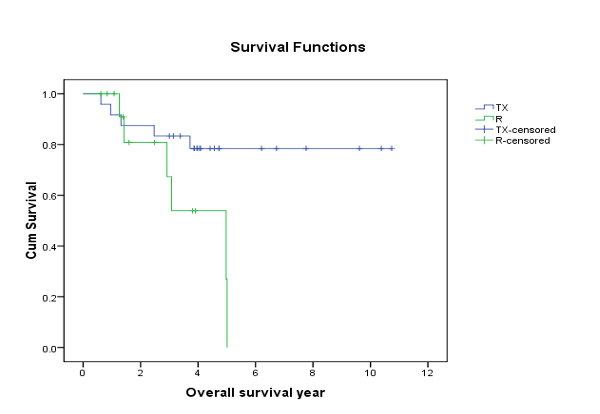Utpala Uday, India has been granted the TTS Scientific Congress Award

Liver resection versus transplantation for management of combined hepatocellular-cholangiocarcinoma (cHCC-CCA)
Utpala Uday1, Sadhana Shankar1, Ashwin Rammohan1, Mohamed Rela1.
1Institute of liver disease and transplantation, Dr. Rela Institute and Medical Centre, Chennai, India
Introduction: Combined hepatocellular-cholangiocarcinoma (cHCC-CCA) is a primary liver tumour with a poor prognosis. It is difficult to identify on pre-operative imaging and is commonly diagnosed on the final histopathology. When recognized clinically, resection is the standard management, if feasible. However, this has historically shown dismal survival rates. Thus, we evaluated liver transplantation as an alternative to resection for this rare tumour.
Method: We did a retrospective analysis of all patients with the diagnosis of cHCC-CCA on histopathology, after resection or liver transplant done at our centre, from 2013 to 2023.
Results: A total of 40 patients were identified, of which 35% (n=14) underwent hepatic resection and 65% (n=26) underwent liver transplantation. cHCC-CCA was more commonly seen in males, 77.5% (n=31). The median duration of follow-up was 45 months. There was a significant difference (p<0.05) in overall survival and recurrence-free survival between the resection and transplant groups. Overall survival was 56 months in the transplant group (SD=32 months) versus 29 months in the resection group (SD=18 months). 1-year survival rates for transplant and resection were similar (84.6% vs 85.6%); however, the 3-year survival rate was better in the transplant group (76.9% vs 35.7%).

On sub-analysis of the data based on UCSF criteria, the survival advantage of transplantation persisted for patients within UCSF (n=29); but for patients outside UCSF criteria, no difference in survival was seen (32 months vs 30 months, p>0.05).
Conclusion: Liver transplantation is a viable alternative to resection for patients with cHCC-CCA, and may have a survival advantage over hepatic resection in selected cases.
[1] Combined hepatocellular-cholangiocarcinoma
[2] Liver Transplantation
